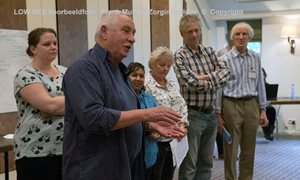
In the category PhD candidates, Maarten Jansen, who recently obtained his PhD from the Radboud University, won the Knowledge Connectors Global Health Award. Maarten studied how various countries (re)consider the composition of their basic health care insurance and how citizens can be given a role in this, for example like the Citizens’ Counsils used in England. Insights from Maarten's dissertation provide building blocks for the embedding of citizen participation in the Netherlands.
During an online public event on 10 December, the winners were announced of the first edition of the Kennis Connectors Global Health award.
Maarten Jansen's dissertation is titled ‘Priority setting for universal health coverage: the use of evidence-informed deliberative processes to support health benefit package design’.
https://www.kcgh.nl/nieuws/winnaars-kcgh-prijsvraag-bekend (in Dutch)
With this contest and in awarding this prize, Kennis Connectors Global Health (KCGH) challenged master's and PhD students to make insights from their research applicable to the Dutch health sector.
In his application for the award, Maarten wrote:
"Several countries are in the process of designing or rethinking the composition of their basic package of (health) care services in order to promote universal health coverage. This thesis reflects the methodological development of evidence-informed deliberative processes (EDPs) and analyzes the implementation and evaluation of EDPs in a number of countries. In the Netherlands, the report Kiezen voor houdbare zorg - Mensen, middelen en maatschappelijk draagvlak of the Wetenschappelijk Raad voor het Regeringsbeleid (WRR) was recently published. This report argues for "well-considered, clear and sometimes sharp choices in the interest of accessible and high-quality care and of broad health gains." The Citizens' Forum 'Choices in Health Care', organized as part of my dissertation, is cited in the report as an example of enabling 'ordinary citizens' to have a say in the composition of their basic package. It is recommended that such an initiative be embedded within the broad health care package management in the Netherlands, as happens at the British package manager NICE in the form of Citizens' Councils. My dissertation provides the building blocks for that embedding in Dutch practice."
Related news items

Citizen forum on coverage decisions in the Dutch health insurance benefit package
3 February 2020 In this article published in Value in Health RIHS researchers Leon Bijlmakers, Maarten Jansen and Rob Baltussen describe the preferences and dilemmas expressed by Dutch citizens in eight case studies, all of which require trade-offs between criteria that cannot all be satisfied at the same time. go to page
Wija Oortwijn elected vice-president Health Technology Assessment international
6 June 2019 Wija Oortwijn has been elected vice-president of Health Technology Assessment international (HTAi) for the period 2019-2021. go to page
Beyond the scientist: Ellen van Jaarsveld
21 November 2018 Ellen is assistant Professor at the Department for Health Evidence and at the Department of Primary and Community Care, thanks Jamie for inspiring her husband to cook delicious family meals. go to page
Presentation of Manifesto citizen forum Choices in healthcare
14 June 2018 Which treatments, according to Dutch citizens, should be covered in the health insurance package? And on the basis of which arguments? go to page
Shorter-term provision of antibiotics in Lyme disease is cost-effective
25 April 2018 In a PLOS One publication Eddy Adang, Anneleen Berende en Bart Jan Kullberg, showed that shorter-term provision of antibiotics in patients with persistent symptoms attributed to Lyme disease is cost-effective. go to page
